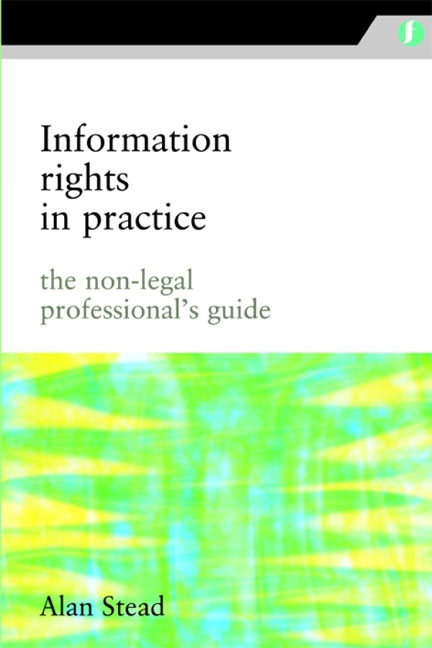Book contents
- Frontmatter
- Contents
- Acknowledgements
- Table of statutes and case law
- Abbreviations
- 1 Introduction
- 2 Data Protection Act 1998
- 3 Definitions of personal data
- 4 The scope of the Data Protection Act
- 5 The data protection principles
- 6 Access to personal data
- 7 Data sharing
- 8 The Freedom of Information Act 2000 and Environmental Information Regulations 2004, SI 2004/3391
- 9 Scope of the Freedom of Information Act 2000 and the Environmental Information Regulations 2004
- 10 Application of exemptions and exceptions
- 11 The public interest test
- 12 Publication schemes
- 13 Compliance, the Information Commissioner and the Information Tribunal
- 14 Disclosure logs
- 15 Records management – Section 46 code of practice
- 16 Other legislation
- 17 Interaction of the legislation
- 18 Summary
- Appendix 1 Data protection principles
- Appendix 2 Flow chart of FOI
- Appendix 3 Exemptions and exceptions under the Freedom of Information Act 2000 and the Environmental Information Regulations 2004
- Appendix 4 Bibliography and useful web addresses
- Appendix 5 Published standards for records management
- Index
2 - Data Protection Act 1998
Published online by Cambridge University Press: 09 June 2018
- Frontmatter
- Contents
- Acknowledgements
- Table of statutes and case law
- Abbreviations
- 1 Introduction
- 2 Data Protection Act 1998
- 3 Definitions of personal data
- 4 The scope of the Data Protection Act
- 5 The data protection principles
- 6 Access to personal data
- 7 Data sharing
- 8 The Freedom of Information Act 2000 and Environmental Information Regulations 2004, SI 2004/3391
- 9 Scope of the Freedom of Information Act 2000 and the Environmental Information Regulations 2004
- 10 Application of exemptions and exceptions
- 11 The public interest test
- 12 Publication schemes
- 13 Compliance, the Information Commissioner and the Information Tribunal
- 14 Disclosure logs
- 15 Records management – Section 46 code of practice
- 16 Other legislation
- 17 Interaction of the legislation
- 18 Summary
- Appendix 1 Data protection principles
- Appendix 2 Flow chart of FOI
- Appendix 3 Exemptions and exceptions under the Freedom of Information Act 2000 and the Environmental Information Regulations 2004
- Appendix 4 Bibliography and useful web addresses
- Appendix 5 Published standards for records management
- Index
Summary
Introduction
‘Probably one of the most complex enactments on the statute book’, says a judge in the UK Court of Appeal. As you have already seen this Act has evolved from European Directive (EC) 95/46, so the ultimate point of appeal is to the European Courts. It is primary legislation which has a big impact on all of our lives regardless of where we work.
The danger comes when individuals either disregard the Act completely or apply it where it should not be applied. It is not here to stop people working or sharing data, but to protect personal data and allow access to most of that which is held by authorities or companies.
Some high-profile cases in the courts have raised awareness of the Act and indicated where it can protect data and even where it cannot. Cases that are of interest include Douglas and others v. Hello! Ltd [2003]. Here photographs were taken of a celebrity wedding which were claimed to be in breach of the Act. This was an interesting case as it was argued that privacy had not been breached because another magazine was already taking photographs of the wedding with a view to publishing them. Another was the matter of Regina v. Huntley [2005], better known as the Soham murders, where a police force wrongly claimed that data on the defendant could not be shared under the Data Protection Act 1998 and there was a lack of a clear retention policy for documents. This case was followed by an in-depth study of the way that the Huntley information was handled, and resulted in revised procedures for handling data in the public sector (Bichard Inquiry, 2004).
The government is concerned that the Act is getting a bad name. It could be very easy for individuals to hide behind the legislation and claim that they do not want to release information because they cannot do so under the Data Protection Act. It should be remembered that the Act only covers personal data – as it is defined in Chapter 3, and that its purpose is not to inhibit data sharing – and that it can not only help to protect an individual's data but also help data sharing by ensuring all the necessary safeguards are in place, making the data reliable in a court of law.
- Type
- Chapter
- Information
- Information Rights in PracticeThe non-legal professional's guide, pp. 7 - 12Publisher: FacetPrint publication year: 2008
- 1
- Cited by



